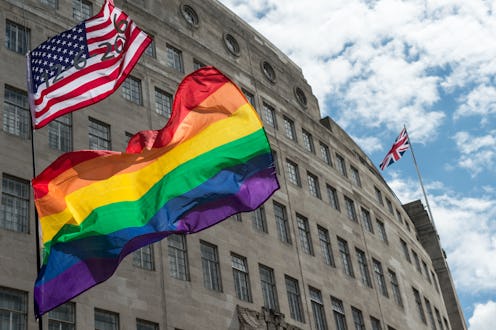News
LGBTQ Representation Among Elected Officials Looks Much Different In 2019 Vs. 2018

According to a report released by the pro-LGBTQ political action committee, Victory Institute, the number of elected LGBTQ officials has gone up this past year, The Hill reported. Since 2018, according to the institute, the total number of openly LGBTQ elected officials has increased from 559 to 698 across the country.
In terms of percentage, that's almost a 25% uptick since last year, NBC News reported. The Victory Institute named officials like Colorado Gov. Jared Polis, Kansas Rep. Sharice Davids, Arizona Sen. Kyrsten Sinema, and Chicago Mayor Lori Lightfoot. Among LGBTQ individuals, the highest increase in representation was among bisexual elected officials. According to the study, the number of elected bisexual officials increased from 15 to 34. That was a stunning 126% increase compared to the last year, the report found.
And for elected transgender officials, representation increased from 13 officials to 20 officials, which is a 53.8% uptick. Furthermore, the number of LGBTQ elected officials who identify as Black, African American, and/or Afro-Caribbean shot up from 30 to 43, and representation among elected LGBTQ officials in the Latinx community increased from 58 people to 74.
Of the 698 openly LGBTQ elected officials, 81% were affiliated with the Democratic Party and 2.7% were associated with the Republican Party, while 14% and 2.3% identified with "other" (unspecified) and independent affiliations, respectively. Additionally, out of the 698 people total, 55% was gay, 33% was lesbian, 4.9% was bisexual, 3.4% identified as queer, and 1% identified as pansexual.
LGBTQ representation is crucial, the institute asserted in its research, because about 11.3 million U.S. adults identify as members of the LGBTQ community. In 2018, GLAAD also found that representation of LGBTQ people in media plays an important role in opening up discussions about mental health, physical health, and safety within the community.
In 2018, the Victory Institute conducted a similar study on LGBTQ elected officials in the United States, and stressed the importance of representation in government. "We believe that representation is power and when someone is in the room and helping to make decisions, they will automatically bring an LGBTQ perspective," Victory Institute Political Director Sean Meloy told Reuters at the time. The organization reinforced this point in its latest findings, stressing that representation still isn't where it should be.
"LGBTQ people hold just 0.13 percent of elected positions," the organization stated in its official report, "despite the most conservative estimates showing LGBTQ people as 4.5 percent of the U.S. population."
There is a lot of work to be done to achieve equality in LGBTQ representation, the institute stated. In order to have equitable representation in government, the Victory Institute reported that the United States would have to elect 22,688 more LGBTQ elected officials.
In a foreword for the study, Annise Parker, the president of Victory Fund and the former mayor of Houston, Texas, wrote, "It is impossible to overstate the enormity of the task ahead." To achieve equal representation, Parker wrote that Americans will have to "identify and support emerging leaders to build a pipeline of LGBTQ people who can run for office, and to champion those already in office to help advance their careers."
"And we must do this," the former Houston mayor added, "while ensuring our greatest strength, the diversity of our community, is appropriately represented along the way."